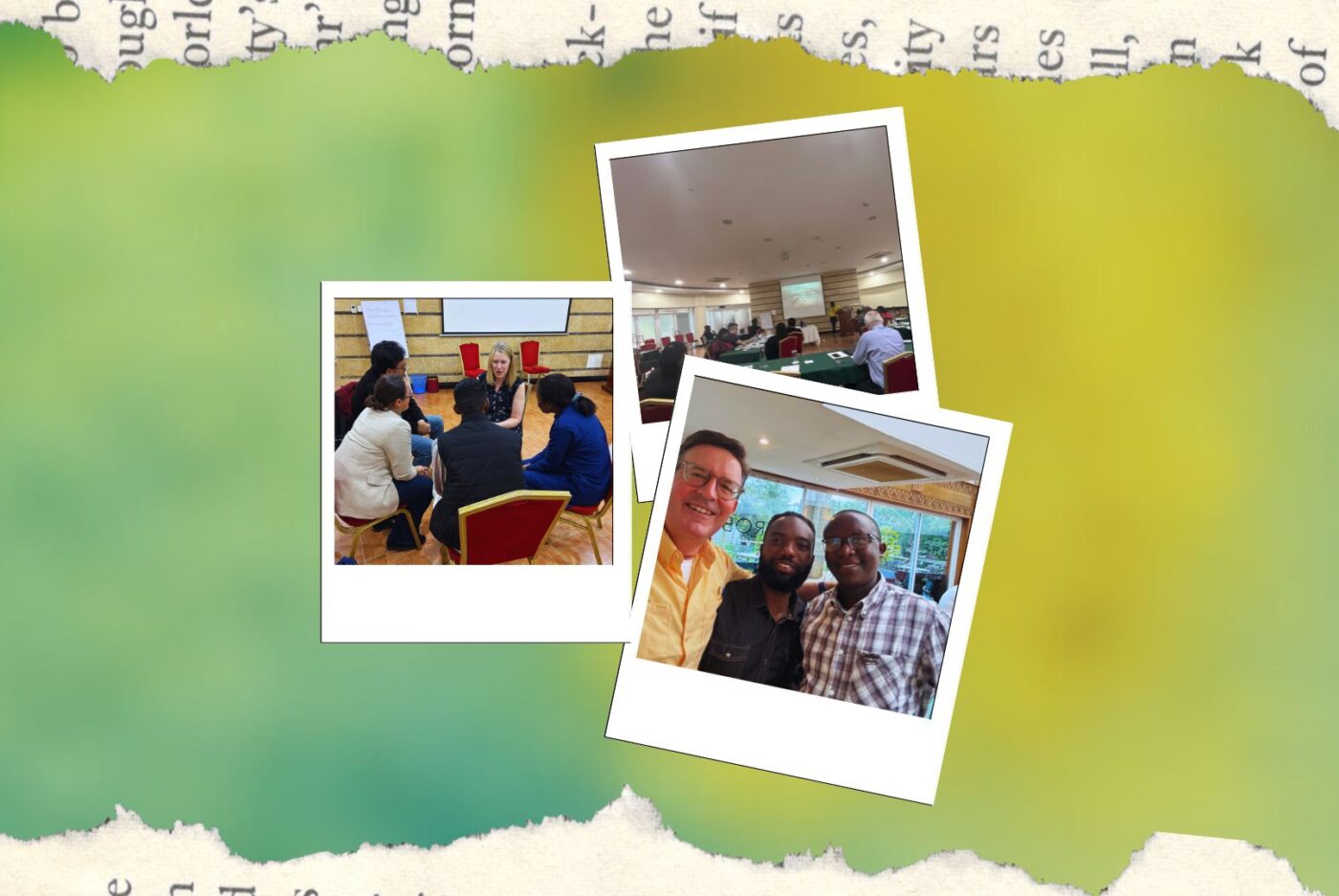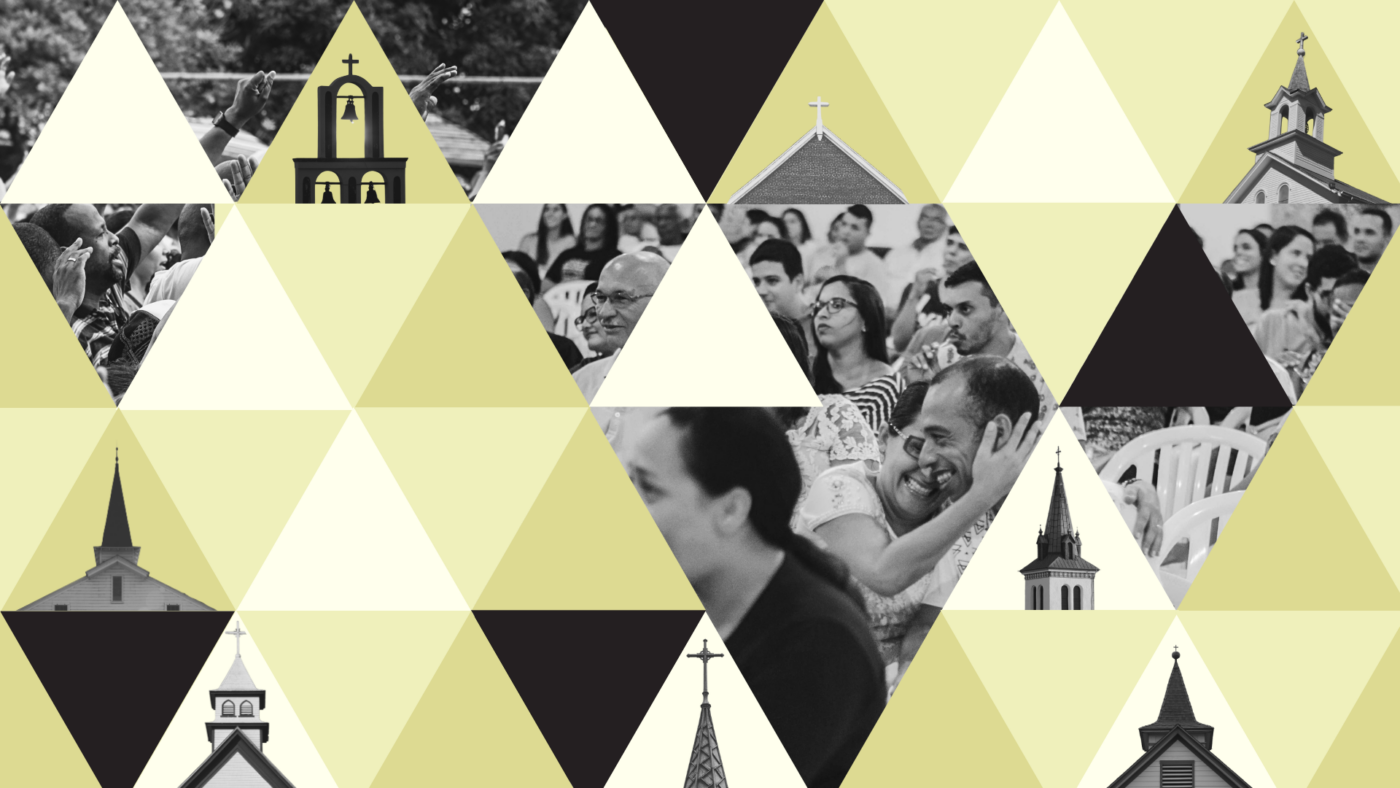Discipleship in a Digital Age
The State of Discipleship in a Digital Age
Welcome to the ‘Fourth Industrial Revolution’
In today’s world, digital devices and platforms have become an integral part of our daily lives. This has led to the need for the church to consider the current state and future of discipleship ministry in relation to the digital landscape.
The digital age began when the Third Industrial Revolution gave rise to digital electronics, including telecommunication, broadcasting, computer, and the internet in the latter half of the 20th century.1 With the advent of the fourth industrial revolution in the early 2010s, the digital age has reached a new phase with the convergence of technologies through the development of the Internet of Things (IoT).
This new era of digitalisation was solidified with the COVID-19 pandemic which limited in-person gathering. The proliferation of communication technologies advanced rapidly during the lock-downs, bringing about the ‘death of distance’—we can immediately interact with and potentially disciple most every distinct people group (ethnos) across the planet, for everyone is now my neighbour (Matthew 28:18–20).2
A conservative estimate for the number of internet users worldwide was 5.16 billion in 2023, or 64.4 percent of the global population.3 This unprecedented digitalisation has affected multiple aspects of our daily lives, including culture, social interactions, business, entertainment, education, and even religion.
The Church’s Mixed Response
The church has been slow to respond to the development of the digital age, especially concerning its disciple-making ministry and mission. Discipleship has been overlooked in the church for decades, as Dallas Willard rightly pointed out that discipleship is the biggest omission from the Great Commission.4 A recent study by Barna Group reveals that only 1 percent of American church leaders believe that today’s churches are effectively discipling new and young believers.5
Many churches have embraced digital devices and platforms such as podcasts, church websites, social media, and streaming services. However, these digital tools are primarily used for evangelism and church growth, only rarely for discipleship.
Beyond America, this issue is a concern for the worldwide church, impacting every place. The comprehensive ‘Analysis of Lausanne 4 Listening Calls’ revealed that the ‘Need for Discipleship’ is the number one gap and opportunity in serving the Great Commission globally.6
This phenomenon is not unrelated to the repercussions of digitalisation. Generally speaking, the decline of people’s religiosity began long before the internet and social media, but it has accelerated and intensified dramatically since their arrival.7 Additionally, increased awareness of secularism and atheism in the 21st century has been conditioned by digitalisation.8 The waves of secularization and digitalization affected all aspects of society, and the church was no exception. The priority of discipleship has diminished with greater distraction than ever and fewer believers fixing their eyes on Jesus. This correlates with wider society’s fixation on novelty in the here and now, captivated by our screens.9
Many churches have embraced digital devices and platforms such as podcasts, church websites, social media, and streaming services. However, these digital tools are primarily used for evangelism and church growth, only rarely for discipleship.
The Possibilities of Information Power and Boundary-Less Disciple-Making
To anticipate future disciple-making, it is crucial to acknowledge the distinctive characteristics of this new phase of the digital age and find ways to incorporate them into our discipleship practices. We currently live in an age of integrated intelligence which enables access to a comprehensive understanding of any topic through information technologies such as AI, big data, and hyperconnectivity among many systems and devices. Digital infrastructures and platforms enable us to build and extend human networks to share information and life experiences.
In light of this, we can identify two characteristics of the digital age, which may contribute to discipleship positively:
- As digitalisation advances, the traditional system of information power is being decentralized, shifting towards a more polycentric model of communication. This allows believers from all walks of life to contribute their perspectives, leading to a healthier community of discipleship.10
- The advanced technological capacity enables us to overcome the barriers of time and geography to meet other disciples and hear their narratives of following Jesus. By sharing personal narratives of discipleship in both local and global contexts, believers can be inspired and challenged to follow Jesus as stories have the power to draw attention, foster engagement, and facilitate actions.11
These characteristics of the digital age may enable believers to seek truthful information for spiritual growth, build relationships in the digital space, and participate in religious activities, such as Bible study, prayer meetings, and worship services, regardless of time and geography.
By embracing innovative approaches that are relevant to their specific contexts in the digital age, churches can continue to develop and multiply disciples in the future.
These positive aspects could be well-regarded and adapted as beneficial in the context of the church’s disciple-making ministry. Many more people are using the internet to explore their faith and connect with others on their spiritual journeys.12 It is encouraging to see that churches in contexts where digital technologies are advanced are actively exploring and experimenting with new avenues of discipleship to direct this spiritual desire of younger generations toward actively following Jesus.
By embracing innovative approaches that are relevant to their specific contexts in the digital age, churches can continue to develop and multiply disciples in the future.

The Effect of Discipleship in a Digital Age
The World
Looking toward the world in cyberspace 2050,13 issues of identity will be paramount and greatly impact our call to make disciples of all the nations. Who am I, who are we, and what do we live for? From social media identities to avatars in the Metaverse, these questions will be ever present and pressing. Focusing on one facet, our work is an especially strategic area in which we are formed as disciples and use our gifts in following Jesus. However, generative AI is projected to automate and thus replace 300 million full-time jobs, as robots do better what a quarter of humans once prided themselves on, and the rest of us increasingly work online managing their output.14
People will need an identity deeper than their job provides, and yet a better story of why their tech-driven labour matters.15 In this context of insecure work and identity, the prospect of being grafted into a global family bearing Christ’s name—where our primary vocation is to love God and love others in networks of genuine trust as we cultivate the planet toward shalom (holistic flourishing)—is good news indeed.16
The Church
This is the identity offered through the ecclesia, reinforced as we corporately learn to follow Jesus in our particular time and place.17 The plural of disciple is church, and we exist as a learning community defined by holistic spiritual practices which shape each member to live as Jesus would if he were you.18 What makes for transformative education is thus an essential concern for the church. Churches must discern among many online resources, ensuring that knowledge translates into practical wisdom in everyday life.19
This aligns with insights from learning theory, which suggests that 70 percent of learning occurs informally in everyday life, 20 percent through community interactions, and only 10 percent through formal interventions.20 Digital networks can help Christians connect beyond physical gatherings as the scattered church, sharing timely resources to grow together in the whole of life.
Churches, then, must help their people become ‘wise peacemakers’—reflective practitioners who can listen to what’s going on and why in their context, imagine what should be going on as they contextualize diverse digital sources that fuel their discipleship, create change that aligns with the kingdom, and learn to communicate the gospel in a way that is truly good news in their time and place.21 We especially need wisdom to be fruitful followers of Christ in the digital spaces where we increasingly spend our time.22
The Great Commission
The digital age may be leveraged to augment our Great Commission efforts to make disciples, but only if our approach enhances, rather than displaces, the embodied practices at the heart of following Jesus together.23
God’s medium to bear the gospel and make disciples was not a detached tweet; redemption and sanctification did not depend on digital means but rather were embodied, incarnated, as the ‘the Word became flesh and moved into the neighbourhood’ (John 1:14, MSG).24 Becoming disciples who disciple all people groups happens in a community of character where—as we practice giving and receiving love—we are shaped to bear God’s faithful presence in the world.25 As such, digital resources are best utilized to enhance focal practices (such as table fellowship), which make tangible God’s kingdom and are most transformative when we are physically gathered.26 Data devoid of a physical frame is digital gnosticism.
Consuming resources without accountability to act decisively makes for virtual disciples. As we practice the way of the kingdom, our head, heart, and hands—formed in wisdom, virtue, and the skill of peacemaking— synergise to serve shalom as a whole-life witness.27 Against the implicit values of technology, especially ease and efficiency, disciple-making requires ‘friction’ to grow in ‘anti-fragility’ and learn how to sacrificially love the world as Christ loved us.28
With these principles in mind, we may now consider fruitful ways forward at this cyber-juncture.

Opportunities and Challenges
Opportunities
The digital space is where the people are, whether we like it or not. The question becomes, will we enter in (1 Corinthians 9:22)? We have an unprecedented opportunity to infuse discipleship learning into the everyday life of every believer, by saturating their digital consumption with disruptive re-directions to the embodied life of following Jesus.29 Multitudes stand in the valley of decision. Moment by moment, they are deciding on something.30 If we are not present in the digital space, pressing people toward inconvenient Christ-like following, they will simply decide on something easier.31
As we advise discernment regarding digital consumption and its inherent dangers, we can trust the gospel of Jesus Christ to retain its superseding power, cutting through the impediments of the digital landscape, and allowing us to leverage hi-tech tools to shape our hearts in synergy with face-to-face guidance (1 Corinthians 11:1).32 Paul’s ‘asynchronous discipleship’ through letter writing to Rome—a fledgling community of believers he’d never physically visited—sets a noteworthy precedent.33
Following are three categories of discipleship opportunities now present in the digital age, offering concrete examples for further exploration in the endnotes.
Access to the tender places:
- Privacy: Digital avenues of discipleship circumvent the bystander effect. Interacting mostly on a private, individual basis, people in the digital space are more open to deep consideration and honest responses.34 Disciples share socially unacceptable struggles and take challenging discipleship to heart in digital exchanges where fear of judgment is removed, bringing their most private questions and problems to the internet.35 We can meet these needs compassionately, nudging difficult conversations toward embodied discipleship relationships.
- Immediacy: Digital communication offers the opportunity to disciple people through the most painful moments of life—during a mental health crisis, at the scene of trauma, in a marital fight—immediately.36 In these moments, we desperately need discipling but seldom feel up to calling on a church leader for guidance.37 This could lay the groundwork for an ecclesial culture of confessional honesty.
- Equality: In the digital discipleship space, we can give every person a voice.38 Its leveling effects may be helpful for discipling those who have been traumatized by authoritarian church structures unreflective of the heart of Christ. These same digital platforms can bridge churchless believers back into physical fellowship.39
Including the excluded:
- Governmental: The web provides us the means of supplying discipleship materials and inclusion in discipleship communities to people in religiously hostile nations.40
- Financial: Many digital discipleship resources are free, making them available to those who would have otherwise been content-impoverished due to the lack of funds.41 Digital resources enable understaffed or small churches to augment their modalities of discipleship without the need for a large budget or hiring more leaders.42
- Situational: Digital communities, streaming events, and virtual meetings offer a means of participation for the truly house-bound, such as the immuno-compromised, mothers of tiny babies, and people who live in remote, rural, and undeveloped locations.43, 44
Reaching far and wide:
- Range: Digital platforms enable us to reach more people, further, and faster.45 Built-in tracking and data analyses provide digital insights to help us maximize effectiveness by matching particular discipleship topics to particular communities.46
- Frequency: Online communities and discipleship resources invite daily peer-to-peer interaction, encouragement, support, and connection at a level of frequency that would be time-prohibitive and invasive if attempted in person.47
- Scope: Digital discipleship communities foster identification with the global church.48 Where digital isolation rends us from our historical identity as the people of God, digital tools can reconnect us to the worldwide body of which we are a part.
In addition to the categories above, the digital age presents the distinct opportunity to emphasize in our discipleship embodied connection, face-to-face interaction, slow and steady commitment, and physical proximity as direct antidotes to the isolation, utilitarianism, and abstraction by which the digital age has harmed our humanity.
Challenges
What, then, are the challenges that our digital age poses for advancing the Great Commission? The first will be leveraging digital tools for disciple-making without losing sight of the vital role of enfleshed relationship in the process. Relying too heavily upon digital tools could work against the formation of Christ-like character if excessive emphasis is placed on content delivery rather than on real life interactions and the expression of faith in community.49 Exercising discernment around how our digital tools can facilitate greater engagement with God and with one another without falling into the trap of reinforcing passive consumption will be important.50
The second is the reality that the digital world is a formation machine.51 Every technological advancement changes how human beings think, behave, and relate.52 The digital world can misshape us by reinforcing unhealthy habits and rehearsing liturgies that are embedded with falsehood.53 Therefore, in a world where technology is changing at a rapid pace, our disciple-making models will need to:
- Uphold a vision of what flourishing looks like, not just as followers of Jesus but also as human beings in our time and place.54
- Engage with reflective practices that will grow self-awareness and media literacy as we live and engage in the digital era.55
- Adopt habits and practices individually and communally that will counteract the negative impact of living in a digital world. For example, intentionally practising hospitality.56
Finally, there is the challenge of contextualisation for both Christian content creators and leaders who are curating digital content for use in disciple-making communities. As the world becomes increasingly digitally connected, discerning how digital resources will assist and not harm followers of Jesus—as they learn to love God and one another in the midst of diverse contexts—will be vital. There is a risk of cultural homogenisation, such as amplifying Western ideas at the expense of enabling the gospel to find its fullest expression in the local context.57
Navigating these challenges will require intentional, vigilant strategies. It will include creating opportunities for meaningful connections, curating reliable and relevant resources, establishing accountability structures, fostering self-discipline, and leveraging technology to facilitate deeper engagement. A wise, humble, prayerful, and discerning approach will help us navigate the challenges and maximize the potential for impactful disciple-making in the digital age both now and into the future.

Key Resources
Across this article, we have referenced many resources. Like the discovery of nuclear power, digital developments hold promise and peril for disciple-making—so we need help to make sense of our situation as this technology becomes ‘universal’, affecting everything.58 However, sourcing experts along isolated disciplinary lines is part of our dilemma rather than a solution to ‘wicked problems’ surrounding the trajectory of the Great Commission from today to 2050.59
We need a Spirit-led and prayer-full integration of expertise, guided by God’s Word, to respond well. We need wisdom to discern what is timely for developing disciples who follow Jesus in their particular and complex digital context.60
What, then, are the human resources within the global church—especially within the Lausanne Movement —which must be brought together as we listen, finding a better way forward through divine conversation?61 How might they help us answer these crucial questions?62
Theology Working Group and Church Planting:
- What does it mean to bear Christ’s image in a digital age as embodied beings?
- How do we best form whole-life disciples, and how might virtual gatherings help or hurt this process, especially for those physically isolated from church?
- What is best practice in online education for transformation?
- What is the purpose, theologically understood, of work, and technology—as spheres where we serve as disciples—and how is this formed or deformed in this digital age?
Media Engagement, Technology, and Scripture Engagement:
- How might digital communication augment face-to-face practices, or distort the disciple-making process?
- Based on industry standards, what are the best practices for not only broadcasting information but networking toward transformation?
- How might we leverage the strengths of decentralized information power and readily available resources to support place-based Scripture engagement?63
- What technological innovation will help people connect an ancient biblical word to their modern context, guarding against digital imperialism from more tech-savvy cultures?
Business as Mission, Tentmaking, and Workplace Ministry:
- How can we equip every believer to find their identity in Christ—habitually guarding against deformation from being constantly ‘on’—and become fruitful in their tech-driven labour amidst automation and precarious work?
- How can we tilt digital work and AI to serve the common good and disciple the nations, rather than damage the fabric of community and endanger life and livelihood?
Cities, Disability Concerns, and Health for all Nations:
- How might technology network groups pursue a kingdom movement to disciple their city with streamlined coordination?
- How does screen time impact our brains (mental health), bodies, and communities? How might we augment the good and restrain the bad in our disciple-making for life to the full?
- What physical spaces, practices, and resources are needed to disciple the growing number of ‘digital refugees’ who are left behind and out of community, and to form in-person relationships for the isolated and anxious?
Ministry Collaboration and Ministry Fundraising:
- How might cryptocurrency and digital media foster partnership—giving and receiving disciple-making resources—for the persecuted church?
Younger Leaders Generation and Lausanne Generations Conversation:
- What platforms exist to connect disciples cross-generationally, so the questions and answers of young and old alike interact to form wise peacemakers in this cultural moment?64
Prioritizing interdisciplinary conversations is key to closing this gap in the Great Commission. As we move deeper into this digital age, spaces for discipleship seem to only continue to grow and emerge. May we step into these spaces with wisdom, seeking to further the Great Commission and disciple our digital world with faithfulness.
Endnotes
- This convergence of all technologies includes robotics, but the commonality is computer programming and communication between all devices. See Steven E. Schoenherr, ‘The Digital Revolution’ (2004), https://web.archive.org/web/20081007132355/http:/history.sandiego.edu/gen/recording/digital.html.
- Frances Cairncross, The Death of Distance 2.0: How the Communications Revolution Is Changing Our Lives (Boston: Harvard Business School, 2001).
- Simon Kemp, ‘The Changing World of Digital in 2023,’ We Are Social (January 26, 2023), https://wearesocial.com/uk/blog/2023/01/the-changing-world-of-digital-in-2023/.
- Dallas Willard, The Great Omission: Reclaiming Jesus’s Essential Teachings on Discipleship (Oxford: Monarch Books, 2006).
- Barna Group, ‘New Research on the State of Discipleship,’ Research Releases in Leaders & Pastors (December 1, 2015), https://www.barna.com/research/new-research-on-the-state-ofdiscipleship/.
- Global Listening Team, ‘The Evangelical Church Interacting between the Global and the Local,’ An Executive Analysis of Lausanne 4 Listening Calls (2022), https://lausanne.org/l4/global-listening/the-evangelical-church-interacting-between-the-global-and-the-local.
- This is particularly seen in the West, but there is a general correlation between digital penetration and decreasing religiosity, seen—for instance—in China’s cities versus rural life. See, Eli Gottlieb, ‘Analog Faith in a Digital Age,’ Religion & Politics (March 17, 2021), https://religionandpolitics.org/2021/03/17/analog-faith-in-a-digital-age/.
- Teemu Taira, ‘Secularism, Atheism, and Digital Media,’ in Heidi A. Campbell and Pauline Hope Cheong (eds), The Oxford Handbook of Digital Religion (New York: Oxford University Press, 2022; online edn., Oxford Academic, 20 Oct. 2022), https://doi.org/10.1093/oxfordhb/9780197549803.013.7.
- Nona Jones, From Social Media to Social Ministry: A Guide to Digital Discipleship (Grand Rapids: Zondervan Reflective, 2020), 1–16.
- However, as one reviewer – Kamal Weerakoon – observed, ‘there is a counter-movement of information power re-centralisation in privately owned meta-platforms including Meta, Amazon, Google, and Microsoft.’ This is not value-neutral, and often tilts algorithms and content away from Christian ways of life and identity, even censoring or misrepresenting our beliefs. See, for instance, https://www.christiantoday.com/article/amazon.accused.of.censorship.after.removing.christian.philosophers.trans.critical.book/136412.htm.
- As Andy Bannister pointed out in review of this article, however, humans are finite, with a limited capacity to sustain large social networks without these relationships becoming shallow. See Roger Bretherton and Robin Dunbar, ‘Dunbar’s Number goes to Church: The Social Brain Hypothesis as a Third Strand in the Study of Church Growth,’ Archive for the Psychology of Religion 42, no. 1 (2020), 63–76, https://journals.sagepub.com/doi/pdf/10.1177/0084672420906215.
- For example, one study showed that 59% of practising Christian Millennials say they have searched for spiritual content online. See, Hannah Stevens, ‘Church in a Digital Age,’ Transmission (Spring/Summer 2019), https://www.biblesociety.org.uk/content/explore_the_bible/bible_in_transmission/files/2019_spring/Church_in_a_digital_age.pdf. Additionally, 25% of Internet users (28 million people) in America have accessed religious or spiritual information online at one point or another. This is an increase from survey findings in late 2000, which showed that 21% of internet users – or between 19 million and 20 million people – had gone online to get religious or spiritual material. See, Elena Lasen, ‘CyberFaith: How Americans Pursue Religion Online,’ Pew Research Center (December 23, 2021), https://www.pewresearch.org/internet/2001/12/23/cyberfaith-how-americans-pursue-religion-online.
- By cyberspace, we mean ‘the complex environment resulting from the interaction of people, software, and services on the internet by means of technology devices and networks connected to it, which does not exist in any physical form.’ See National Institute of Standards and Technology, ‘Cyberspace,’ NIST Glossary (December 2015), http://dx.doi.org/10.6028/NIST.IR.8074v2.
- World Economic Forum, ‘The Future of Jobs Report 2023,’ Insight Report (May 2023), https://www.weforum.org/reports/the-future-of-jobs-report-2023/. For a Christian interpretation of these trends, and a richer anthropology leaning into our distinctiveness as humans, see https://licc.org.uk/resources/the-robot-will-see-you-now/ (2022), http://www.johnwyatt.com/, and John Wyatt and Stephen N. Williams (eds.), The Robot Will See You Now: Artificial Intelligence and the Christian Faith (London: SPCK, 2021).
- Ethan J. Brue, Derek C. Schuurman, and Steven H. Vanderleest, A Christian Field Guide to Technology for Engineers and Designers (Downers Grove, IL: IVP Academic, 2022). James Bruyn – Assistant Professor at Leder School of Business, The King’s University, Edmonton – explores the discipleship opportunity this presents in his unpublished 2023 paper, ‘Understanding the Spiritual Challenges of the Contemporary Corporate Workplace,’ https://bit.ly/SpiritualChallengesContemporaryWork.
- Gordon Preece, ‘Rehumanizing Precarious Work: Vocation in Location Versus a New Priesthood of Cosmopolitan Techno-Creatives,’ in Transforming Vocation: Connecting Theology, Church, and the Workplace for a Flourishing World, ed. David Benson, Kara Martin, and Andrew Sloane (Eugene, OR: Wipf & Stock, 2021), 88–107; John G. Stackhouse, Jr., Why You’re Here: Ethics for the Real World (Oxford: Oxford University Press, 2018), 13–63 (excerpt, ‘Is That Why Christians are in the World?’ at https://www.johnstackhouse.com/post/is-that-why-christians-are-in-the-world). On the necessary transformations in ontology and epistemology as part of discipleship in the digital age, see Guichun Jun, ‘Missional Discipleship in the Public Sphere: With Special Reference to Lordship, Followership and Christlikeness in the Concept of Public Discipleship,’ Transformation 39, iss. 2 (2022), 111–121, https://doi.org/10.1177/02653788211062462.
- Matt Jolley, ‘What Is a Whole-Life Disciple?’ LICC (2021), https://licc.org.uk/resources/what-is-a-whole-life-disciple/; see also https://youtu.be/DOOd1G2R7Pw.
- Ross Hastings, ‘Vocation from Union with Christ: Overcoming Dualisms in the Calling of the Church,’ The Regent World 33, no. 1 (April 20, 2021), https://world.regent-college.edu/leading-ideas/vocation-from-union-with-christ–overcoming-dualisms-in-the-calling-of-the-church; Matt Jolley and Dave Benson, ‘What Are Spiritual Practices?’ LICC (2021), https://licc.org.uk/resources/spiritual-practices/.
- Simon Foster, ‘What Helps Disciples Grow?,’ Saltley Faith & Learning Series no. 2, edited by Ian Jones (Birmingham: St Peter’s Saltley Trust, 2016), https://www.saltleytrust.org.uk/whdg/; Paul Wetzig, ‘Faith in the Digital Age,’ Unpublished report prepared for the Uniting Church of Queensland (December 12, 2019).
- ICETE, ‘Characteristics of Effective and Fruitful Nonformal Theological Education,’ The International Council for Evangelical Theological Education (April 2023), http://icete.info/wp-content/uploads/2023/04/Characteristics-of-effective-and-fruitful-nonformal-theological-education.pdf. See also David Heywood, Kingdom Learning: Experiential and Reflective Approaches to Christian Formation (London: SCM Press, 2017); Jenny Rogers, Adults Learning, 5th ed. (Maidenhead, UK: Open University Press, 2007). On the 70–20–10 principle and the Kolb cycle, see https://702010institute.com/702010-model/. And for application of these principles to ‘flipped’ and distance learning, see Diane Hockridge, ‘Rethinking Our Approach to Student Formation in Australian Theological Education,’ in Theological Education: Foundations, Practices, and Future Directions, ed. Andrew M. Bain, Ian Hussey (Eugene, OR: Wipf & Stock, 2018), 200–214. Diane Hockridge is the online education specialist for Australia’s largest consortia of theological colleges, The Australian College of Theology. See https://ridley.academia.edu/DianeHockridge for more. For ways these principles are being used in the global church, supported by affordable technology to increase digital penetration to even the least reached parts of Africa, see https://icete.academy/course/index.php?categoryid=15, https://youtu.be/w3l1SB8zyv0, https://chatterbox.co.zw/, and https://thewell.systems/.
- See Dave Benson’s ‘Wise Peacemakers’ (2021) 5-part blog series starting at https://licc.org.uk/resources/wise-peacemakers-part-1-of-5/. For an example of this process applied to discipleship in a digital age, see Matt Jolley, ‘Rage Against the Machine’ (2021) Wisdom Lab and 2-part blog series at https://licc.org.uk/resources/wisdom-lab-rage-against-the-machine/.
- Dave Benson, ‘Being Fruitful on Facebook: Wisdom for the Web,’ LICC (November 5, 2020), https://licc.org.uk/resources/being-fruitful-on-facebook-wisdom-for-the-web/; Jodi Hunt, ‘The Digital Way: Re-imagining Digital Discipleship in The Age of Social Media,’ Journal of Youth and Theology vol. 18 (2019), 91–112.
- Quentin Schultze, Habits of the High-tech Heart: Living Virtuously in the Information Age (Grand Rapids: Baker Books, 2002). For a critique of disembodied discipleship that cultivates ‘brains on a stick’ through information dissemination, see James K. A. Smith, Desiring the Kingdom: Worship, Worldview, and Cultural Formation (Grand Rapids: Baker Academic, 2009). Cf. 2 John 12 where John uses letter-writing technology to disciple, but longs to gather.
- Michael Pucci, ‘The Gospel and Human Poverty,’ in Hearts Aflame: Living the Passion for Evangelism, ed. Michael Tan (Singapore: Genesis Books and Eagles Communications, 2008), 222–224. Of course, God’s revelation included language, inspiring Scripture. But this all pointed toward the embodied ‘Christ event’ (Hebrews 1:1–3).
- While digital devices and platforms can be useful tools for discipleship, true growth as a disciple comes from being part of a local community where face-to-face interactions can provide inspiration and challenge with accountability. See Stanley Hauerwas, A Community of Character: Toward a Constructive Christian Social Ethic (Notre Dame, ID: University of Notre Dame Press, 1991); David Fitch, Faithful Presence: Seven Disciplines that Shape the Church for Mission (Downers Grove, IL: IVP Books, 2016); Dave Benson, ‘The Ecclesial Apologetic for God: Becoming a Good Church in the Eyes of a Watching World,’ Lausanne Movement Europe (2021), https://www.lausanneeurope.org/the-ecclesial-apologetic-for-god-becoming-a-good-church-in-the-eyes-of-a-watching-world/.
- ‘Focal practices’ comes from Albert Borgmann, Power Failure (Grand Rapids: Brazos Press, 2003), as unpacked and actioned by Andy Crouch, The Tech-Wise Family (Grand Rapids: Baker, 2017). See also: David Fitch’s work at https://sevenpractices.org/; Matt Jolley, ‘Rage Against the Machine: What Do We Do Now?’ LICC (2021), https://licc.org.uk/resources/what-do-we-do-now/; Justin Whitmel Earley, The Common Rule: Habits of Purpose for an Age of Distraction (Downers Grove, IL: InterVarsity Press, 2023), https://www.thecommonrule.org/.
- Dave Benson, ‘A Litany of Practices,’ Practical Theology (January 7, 2019), https://doi.org/10.1080/1756073X.2019.1565080/. For more on tailoring spiritual practices for this digital age that are embedded in our virtual and physical frontlines, see https://licc.org.uk/resources/how-to-change-your-habits-and-let-god-change-you/ and https://licc.org.uk/resources/research-embedding-spiritual-practices-and-seeing-the-benefits/, embedded in LICC’s 2023 course, ‘Growing on the Frontline’, available at https://licc.org.uk/ourresources/growing-on-the-frontline/.
- Nassim Nicholas Taleb, Anti-Fragile: How to Live in a World We Don’t Understand (London: Allen Lane, 2012); John Wyatt, ‘Welcome to the Metaverse,’ Connecting with Culture LICC Blog (November 26, 2011), https://licc.org.uk/resources/welcome-to-the-metaverse/.
- James R. Reed III and Lori C. Reed, Reimagining the Great Commission: 21st Century Digital Discipleship (np: 2019), 10.
- Andrew Palau, ‘Made to Share,’ presentation, The Luis Palau Association (Beaverton, OR: February, 2023).
- Nona Jones, From Social Media to Social Ministry: A Guide to Digital Discipleship (Grand Rapids: Zondervan, 2020), 12.
- Julie Anne Lytle, Faith Formation 4.0 (New York: Church Publishing Inc., 2013), Kindle Locations 2685–2689.
- Physical presence in a church gathering doesn’t guarantee we are mentally present. Conversely, through our union in Christ by the Spirit, we may be physically absent but still practising ‘comm-union’ (1 Corinthians 5:3). Prayer and Scripture engagement, for instance, are transformative in disciple-making though they don’t depend upon being bodily with another person. As such, whether in person, on zoom, or as an avatar (from Hinduism, literally meaning ‘incarnation’) in the Metaverse with VR Church, limiting distraction and being truly present – giving intentional attention and prayerfully focusing on ‘with-ness’ in that moment – is critical to discipleship in every context. See Janet Maria Sewell, interviewed by Joel Forster, ‘Virtual Reality, a Useful Tool in the Hands of the Persecuted Church?,’ Evangelical Focus Europe (June 26, 2023), https://evangelicalfocus.com/life-tech/22565/jan-sewell-church-and-virtual-reality.
- Timo Gnambs and Kai Kaspar, ‘Disclosure of Sensitive Behaviors across Self-Administered Survey Modes: A Meta-Analysis,” Behavior Research 47 (2015), 1237–1259, https://doi.org/10.3758/s13428-014-0533-4.
- George Barna, Churchless: Understanding Today’s Unchurched and How to Connect with Them (Carol Stream: Tyndale Momentum, 2014), 107. See also https://www.cvglobal.co/from-instagram-to-church/ for a real-life example.
- Imagine the individual who steps outside in the midst of a bitter fight with their spouse and searches ‘considering divorce’, or ‘what does God say about suicide’, in YouVersion Bible reading plans.
- Adam Joinson, ‘Social Desirability, Anonymity, and Internet-Based Questionnaires,’ Behavior Research Methods, Instruments, & Computers 31 (1999), 433–438, https://doi.org/10.3758/BF03200723.
- For example, no church authority or permission is required for any individual to invite other church members to an online Bible reading plan where they can discuss the nuances and life application of the Scriptures via an embedded chat feature.
- YouVersion’s church-finding feature offers this opportunity, as does the first-of-its-kind connectivity and resource platform, Gloo (https://www.gloo.us/). Alpha helps new Christians and spiritual seekers in need of discipleship to connect for spiritual growth in either in-person or in online communities. See https://alphausa.org/try/ for more.
- This is, of course, unless they fear surveillance, unable to stay a step ahead of their anti-democratic, censorious government. For how this has played out in China, see https://www.nytimes.com/2022/06/21/world/asia/china-surveillance-investigation.html, https://anglican.ink/2023/01/19/chinese-new-year-of-weaponised-surveillance-against-christians/, and https://www.opendoors.org.au/world-watch-list/china/. For a global perspective, see David Lyon, The Culture of Surveillance: Watching as a Way of Life (Cambridge, UK: Polity Press, 2018); also John Lennox, 2084: Artificial Intelligence and the Future of Humanity (Grand Rapids: Zondervan, 2020).
- Free digital Bible resources such as YouVersion, Blue Letter Bible, The Bible Project, Public Reading of Scripture, and Theology of Work offer a searchable digital Bible, thousands of devotionals and reading plans (available in most languages) that can be shared and worked through with a group, and much more, providing opportunities for interaction, conversation, and mutual accountability. See https://prsi.org/, https://www.blueletterbible.org/, https://www.bible.com/, https://bibleproject.com/, https://prsi.org/, and https://www.theologyofwork.org/ for more.
- For resourcing pastors and leaders, multiple Christian organizations, such as Gloo and Alpha, provide free online training and equipping for discipleship best practices as well as inspiring and practical information on creating a discipleship-forward church culture. See https://www.gloo.us/ and https://alphausa.org/ for more.
- Online discipleship mentoring through The Mentor Ministry, JesusCares.com, Gloo, and Unite Life pair Christians and spiritual seekers all over the world with caring, well-trained mentors who provide a safe place to bring doubts, hard questions, and prayer requests for personal struggles through one-on-one email and text messaging. This resource is particularly useful for those in remote areas where there is not a local church body available to help, or where education and resources are extremely limited. See https://tmm.io/, https://www.jesuscares.com/, https://www.gloo.us/, and https://unitelife.com/ for more.
- Life Church, the Church from which the YouVersion ministry developed, is one of many now offering virtual reality church experiences in the Metaverse. See https://www.life.church/metaverse/ for more. Yet, facilitating in-person gathering is the goal.
- One example is translation of the Bible and discipleship resources into nearly any language in the world via AI systems such as google translate: https://translate.google.com/. Wise interpretation of data is key, though, as ‘clicks’ don’t form character.
- Consider the way discipleship material could be shaped around the felt needs of a community based on web or social media insights telling us which topics are being engaged with the most often by our online community.
- Jesus.net (https://jesus.net/), Got Questions (https://www.gotquestions.org/), and Made New (https://madenew.hopewithgod.com/), are digital discipleship resources offering multiple avenues of self-paced/self-guided learning and support for believers as they seek a deeper understanding of what it means to be a follower of Christ. In addition, digital technologies can make a profound contribution to the area of spiritual practice to augment the in-person, embodied practices of joining voices in worship, partaking communally of the Lord’s Supper, praying for one another directly, and so on. Many apps currently exist to promote and facilitate Biblical meditation (Abide, https://abide.com/; Verses, https://www.getverses.com/; Soultime https://www.soultime.com/), practicing the presence of God (Hallow, https://hallow.com/; Dwell, https://get.dwellbible.com/paid-search/), and developing a daily prayer life (Lectio365, https://www.24-7prayer.com/resource/lectio-365/; Inner Room, https://innerroom.app/). Daily Scripture notifications, or SMS messages, or in-app reminders to pray, meditate on scripture, or engage in a discipleship discussion can co-opt digital systems to strengthen consistency of implementation of embodied spiritual practices.
- Imagine the power of a live time of worship and prayer, with believers from many nations across the globe, to heighten our awareness of the worldwide fellowship of the saints.
- In the Lausanne 4 Global Listening Calls report nearly all groups represented reflected upon the remarkable opportunities that digital tools offer, whilst also recognising that digital content could not replace the need for ‘personal, humanised connections.’ See https://lausanne.org/l4/global-listening/the-evangelical-church-interacting-between-the-global-and-the-local for more.
- Wetzig, ‘Faith in the Digital Age.’
- Mark Sayers, Strange Days: Life in the Spirit in a Time of Upheaval (Chicago: Moody Publishers, 2017).
- Sherry Turkle, Alone Together: Why We Expect More from Technology and Less from Each Other (New York: Basic Books, 2017); Nicholas Carr, The Shallows: How the Internet is Changing the Way We Think, Read and Remember (London: Atlantic Books, 2020), 45; Jean Twenge, ‘Have Smartphones Destroyed a Generation,’ The Atlantic (September 2017), https://www.theatlantic.com/magazine/archive/2017/09/has-the-smartphone-destroyed-a-generation/534198/; Jean Twenge, The Narcissism Epidemic: Living in the Age of Entitlement (New York: Free Press, 2009).
- James K. A Smith, Desiring the Kingdom: Worship, Worldview and Cultural Formation (Grand Rapids: Baker, 2009), 29; Craig M. Gay, The Way of the (Modern) World, or, Why It’s Tempting to Live as if God Doesn’t Exist (Grand Rapids: Wm. B. Eerdmans Pub., 1998), chapter 2. See, for instance, Jaron Lanier, Ten Arguments for Deleting Your Social Media Accounts Right Now (London: Vintage, 2019). Lanier coins the acronym ‘BUMMER’ (‘Behaviours of Users Modified, and Made into an Empire for Rent’) to describe the deformative power of social media and related digital technologies.
- James K. A. Smith, How (not) to Be Secular: Reading Charles Taylor (Grand Rapids: Wm. B. Eerdmans Pub., 2014).
- Schultze suggests that it is irresponsible to adopt every technology without having a critical eye as to what the consequences will be. See Quentin J. Shultze, Habits of the High-Tech Heart: Living Virtuously in the Information Age (Grand Rapids: Baker Academic, 2002). Benjamin Windle, ‘Excerpt: Better Questions and Disciplines for Digital Church Innovation,’ Leaders and Pastors Barna Ideas Release (February 2, 2022), https://www.barna.com/research/excerpt-disciplined-digital/. For an example of reflective practices, see Matt Jolley, ‘Rage Against the Machine: What Do We Do Now?’ LICC (2021), https://licc.org.uk/resources/what-do-we-do-now/.
- See https://sevenpractices.org/ for more. This creates an opportunity for the church to provide meaningful places of face-to-face community centred around the Lord’s supper for disciples who are ‘digital refugees’ by virtue of not being able to keep up with and fully engage in community as the technology continues to develop.
- Matthew Lee Anderson, ‘Christianity and Globalization: A Unity in Diversity,’ Mere Orthodoxy Blog (June 12, 2008), https://mereorthodoxy.com/christianity-and-globalization-a-unity-in-diversity/; The Gospel Coalition India, ‘Discipleship in a Digital Age,’ TGC (May 10, 2022), https://in.thegospelcoalition.org/article/discipleship-in-a-digital-age/.
- Carr, The Shallows, chapter 5; Akos Balogh, ‘As a Christian, I Went Down the AI Rabbit Hole: Here are 12 Things I Discovered,’ Blog (2023), https://www.akosbalogh.com/blog/as-a-christian-i-went-down-the-ai-rabbit-hole-here-are-12-things-i-discoverednbspnbsp; Derek C. Schuurman, Shaping a Digital World: Faith, Culture, and Computer Technology (Downers Grove, IL: IVP Academic, 2013); John Dyer, From the Garden to the City: The Redeeming and Corrupting Power of Technology (Grand Rapids: Kregel Publications, 2011).
- Jon Kolko, Wicked Problems: Problems Worth Solving (Austin: AC4D, 2012), online at https://www.wickedproblems.com/1_wicked_problems.php. See also John C. Camillus, ‘Strategy as a Wicked Problem,’ Harvard Business Review Magazine (May 2008), https://hbr.org/2008/05/strategy-as-a-wicked-problem. In short, wicked problems ‘cannot be definitively resolved. … They have innumerable causes, morph constantly, and have no correct answer.’
- On wisdom for adaptive leadership in complex times, see Tod Bolsinger, Canoeing the Mountains: Christian Leadership in Uncharted Territory (Downers Grove: InterVarsity Press, 2018).
- See https://lausanne.org/all-issue-networks, also https://lausanne.org/l4/lausanne-generations-conversation for these partners. And on ‘divine conversation’, see Adam S. McHugh, The Listening Life: Embracing Attentiveness in a World of Distraction (Downers Grove, IL: InterVarsity Press, 2015), 157: ‘The practice of conversation is a sacred act. … We could modify the practice of lectio divina slightly to create a conversatio divina, the practice of sacred conversation. The foundation of conversatio divina is the belief that God is present in and guides the conversations we give him as offerings, and some that we don’t. We listen not only to another person but to the voice that speaks in, through and in spite of human voices. Then we are free to let go of tight agendas and the need to steer the conversation where we think it should go. We open ourselves to letting it go gently off course and to taking surprising directions and divine detours’ (p157). For an example of this, see https://aiandfaith.org/.
- Every network, across every region, has a contribution to make. By highlighting these few, we are hopeful it will spark each group to consider the questions they must raise, and the resources they might bring to address this gap.
- Further, we need to discern how each mode of Scripture engagement – book, digital, oral – impacts retention, understanding, and transformation. As one digital theologian suggests, ‘The new patterns of Bible engagement available to us—reading Scripture on a screen, sharing Scripture on social media, searching in a language we do not speak, hearing Scripture in the car, and so on—are no more neutral than the advent of the printed Bible several centuries ago. In this digital era, I would encourage you to mix old and new, memorize not just search, meditate not just share, listen not just read, do not just hear. As you use different forms of media to encounter God’s Word, reflect on them with others in your faith community, and work together to make choices out of conviction rather than convenience alone.’ See John Dyer, People of the Screen: How Evangelicals Created the Digital Bible and How It Shapes Their Reading of Scripture (New York: Oxford University Press, 2023), excerpt at https://www.christianitytoday.com/ct/2022/december/dyer-bible-apps-software-screen-printing-press.html.
- As the first generation of iPhone and internet kids come of age, developing relationships with tech-savvy young people and simply taking an interest in where they’re finding connection—for better or for worse, observing and engaging in their cultural world—is essential.









